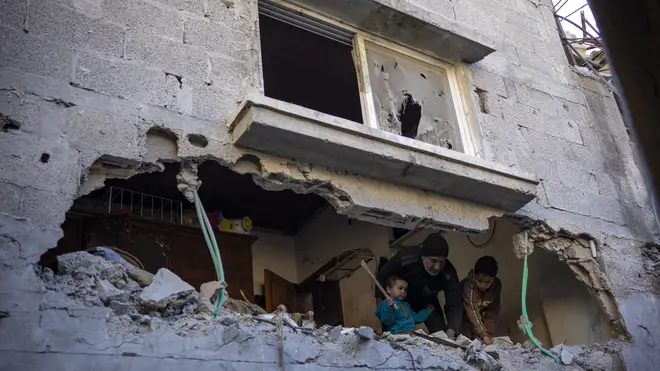
Clive Bull 1am - 4am
9 February 2024, 13:54

US secretary of state Antony Blinken left Israel on Thursday as the divide grows between the two close allies on the way forward.
Israel bombed targets in overcrowded Rafah early on Friday, hours after US officials warned Israel against expanding its Gaza ground offensive to the southern city where more than half of the territory’s 2.3 million people have sought refuge.
Airstrikes overnight and into Friday hit two residential buildings in Rafah and a third strike targeted a kindergarten-turned-shelter for the displaced in central Gaza.
Twenty-two people were killed, according to AP journalists who saw the bodies arriving at hospitals.
The airstrikes came hours after US President Joe Biden said he considers Israel’s conduct of the war to be “over the top”.
The US secretary of state, Antony Blinken, left Israel on Thursday as the divide grows between the two close allies on the way forward.

“I am of the view, as you know, that the conduct of the response in the Gaza Strip has been over the top,” Mr Biden said after delivering remarks on a special counsel report on his handling of classified documents.
Mr Biden added that he continues to push for an extended pause in fighting in Gaza to facilitate the release of the dozens of remaining hostages that were captured during Hamas’s October 7 attack on Israel.
Hamas, however, has demanded that Israel release hundreds of Palestinian prisoners and end the war as part of a hostage deal. Israeli Prime Minister Benjamin Netanyahu has refused to agree to those terms.
But Mr Biden said he still is hopeful a deal can be worked out that might open a path to ending the war.
“I am pushing very hard now to deal with this hostage ceasefire,” Mr Biden said.
“I’ve been working tirelessly on this deal. How can I say this without revealing … to lead to a sustained pause in the fighting in, and the actions taking place, in the Gaza Strip.”

More than half of Gaza’s 2.3 million population has been driven by Israel’s military offensive towards the border with Egypt. Unable to leave the tiny Palestinian territory, many are living in makeshift tent camps or overflowing UN-run shelters.
Aid agency officials sounded warnings over the prospect of a Rafah offensive.
“We need Gaza’s last remaining hospitals, shelters, markets and water systems to stay functional,” said Catherine Russell, head of the UN children’s agency Unicef.
“Without them, hunger and disease will skyrocket, taking more child lives.”
Israel’s stated intentions to expand its ground offensive to Rafah also prompted an unusual public backlash in Washington.
“We have yet to see any evidence of serious planning for such an operation,” Vedant Patel, a State Department spokesman, said. Going ahead with such an offensive now, “with no planning and little thought in an area where there is sheltering of a million people would be a disaster”.
John Kirby, the US National Security Council spokesperson, said an Israel ground offensive in Rafah is “not something we would support”.
The comments signalled intensifying US friction with Mr Netanyahu, who pushed a message of “total victory” in the war this week, at a time when US secretary of state Antony Blinken was in Israel to press for a ceasefire deal in exchange for the release of dozens of Hamas-held hostages.
With the war now in its fifth month, Israeli ground forces are focusing on the city of Khan Younis, just north of Rafah, but Mr Netanyahu had repeatedly said Rafah would be next, creating panic among hundreds of thousands of displaced people.
Mr Netanyahu’s words also alarmed Egypt which has said that any ground operation in the Rafah area or mass displacement across the border would undermine its 40-year-old peace treaty with Israel.
The mostly sealed Gaza-Egypt border is also the main entry point for humanitarian aid.

The Health Ministry in Hamas-run Gaza said on Friday that the overall Palestinian death toll is now approaching 28,000, with about two-thirds women and children. The count does not distinguish between civilians and combatants.
The war began with Hamas’s October 7 assault into Israel, in which militants killed some 1,200 people, mostly civilians, and abducted around 250. Hamas is still holding more than 130 hostages, but around 30 of them are believed to be dead.
Later on Friday the Palestinian Red Crescent Society said Israeli forces had stormed the Al-Amal Hospital in Khan Younis.
The hospital is home to a few dozen people displaced by the conflict as well as the patients and medical staff. Khan Younis has been the centre of the Israeli ground offensive in the past weeks.
Earlier this week, the PRCS said that 8,000 displaced people were evacuated from its headquarters in Khan Younis and Al-Amal Hospital. It said only 40 displaced people and around 80 patients and 100 staff members remain in the medical centre.
The Red Crescent gave no further details about Friday’s raid.
Hamas leader Yehya Sinwar and the commander of the group’s military wing, Mohammed Deif, both grew up in the Khan Younis refugee camp. Israel says the city is a Hamas stronghold.
Hospitals in the Gaza Strip have been hard hit by the war. Israel has repeatedly surrounded and raided Gaza hospitals, saying that Hamas uses the facilities as cover for militant operations.
The raids have forced many hospitals to close and displaced thousands of patients and people who had been seeking shelter.
The few hospitals that remain in operation, including Al-Amal, have been overwhelmed with patients and displaced people seeking refuge.